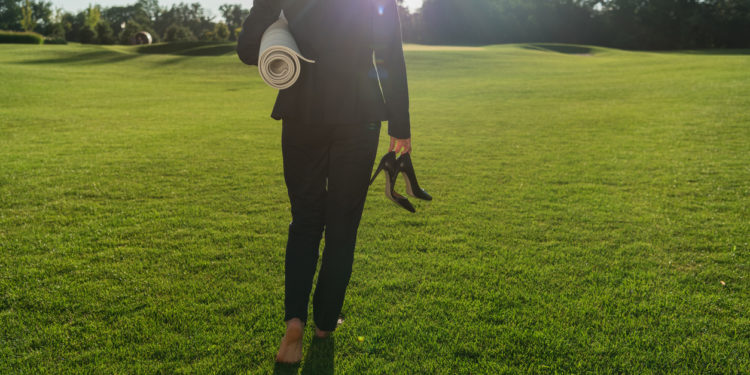Advertisers market their products to fight that 2:30 crash. Coffee chains promote their afternoon caffeinated happy hours to help get you through the day. Some cultures even have an after-lunch siesta to combat fatigue. What if there was a different way to help keep your mind efficient and alert all day? Something as easy as moving?
While an afternoon nap may sound appealing, it is not often a practical solution, and since we live in a quick-fix type of climate, many are left reaching for an energy drink or an afternoon cup of coffee to combat the mental fatigue that hits during those last few hours of the workday. Unfortunately, these types of “fixes” are likely contributing to the cycle of fatigue, not contributing to a lasting improvement in cognitive capacity, and thereby fueling the brain’s growing dependence upon them. Therefore, rather than seeking a temporary, short-term solution that has long-term consequences, the best practices for reducing the experience of afternoon mental fatigue and improving cognitive functioning are found in replacing these quick “pick-me-ups” with other, more positive lifestyle habits which generate benefits to cognitive functioning over time when implemented regularly. The most effective daily practices to implement can be determined through consideration of the physiological components associated with afternoon fatigue and cognitive deficits to help with reducing the frequency and severity of the experience.
The Physiology of the Slump
Afternoon fatigue is not a figment of the imagination. Melatonin, the hormone that regulates sleep and wakefulness (the same one that makes you feel tired to go sleep at night), is signaled by exposure to darkness and by decreases in body temperature. Melatonin is also a factor in maintaining circadian rhythms, the cycle that helps sustain a regular schedule of sleep activity at night and wakefulness during the day. So, when feeling tired in the afternoon, blame melatonin and your body’s sleep-inducing system through a date with a cup of Joe, or try this:
- Step into the sun: Since light signals alertness, and darkness signals sleep, take a mid-day break for a step into the sun or go for a short walk outside.
- Replicate natural light: Get out of the darkness, and redesign a dimly lit office space with light bulbs that provide natural brightness.
The Slump and Your Rump
Health professionals continue to warn about the implications of sitting all day at a desk. It is also true that sitting continuously contributes to afternoon fatigue. The lipoprotein, lipase, an enzyme that is involved in breaking down fats to produce fuel (read here as energy) reduces with inactivity. Thus, prolonged sitting leads to less fuel produced (less energy), contributing to the feeling of both physical and mental fatigue (because brain’s need fuel, too!). So, continue sitting and enjoying a brief, caffeine-induced state of nirvana, or try this:

- Stand up: It really is that simple. Standing requires your muscles to work against gravity, which counts as activity in the eyes of the body’s physiological systems (as discussed in the (NASM CPT Course) Set those timers and get standing!
- No excuses: You can take a break from the project you need completed by 5pm. Breaking from a task and engaging in another activity (like a walk or other aerobic activity) can increase energy production, which in turn stimulates improvement to cognitive functioning (Don’t believe it? Read on!).
But I’m Just Too Tired
When running a marathon, a runner does not begin with 26.2 miles on the first training run. As with most health and wellness programs, positive effects are produced over time. Commit to participating in consistent, daily physical exercise rather than reaching for a quick-fix, and soon, you’ll notice:
- Benefits to Executive Functioning (EF): Regular exercise improves executive functioning abilities, specifically among the three core EFs (Diamond, 2013), which include:
- Inhibition: The ability to override a strong internal or external pull to appropriately act within the demands imposed by the environment
- Working Memory: The ability to mentally represent information, manipulate stored information, and act upon it
- Cognitive Flexibility: The ability to quickly and flexibly switch perspectives, focus attention, and to adapt behavior for the purposes of goal directed action
- Increased capacity to learn and retain information: Regular aerobic exercise training can improve memory and learning (Smith, et al., 2010).
- Prolonged cognitive functioning: Regular daily exercise reduces the onset of age-related loss of brain tissue that often occurs as a part of age-related effects upon the brain over the lifespan while also enhancing the functional aspects of the brain which control cognition (Gomez-Pinilla & Hillman, C, 2013). Exercise now, and your brain will thank you later!
But I’m Working on a Deadline!
There’s a saying in the therapy world, “Trust in the process.” Like any new wellness program, you’ll have to test out this process and experience the benefits yourself. It seems counterintuitive to take a break from work when there is a deadline fast approaching, but resist the temptation to force yourself into finishing a task at the expense of healthy habits. Permit yourself to take breaks, engage in your workout, plan a schedule, and adhere to it. You’ll likely also notice these side effects (which are way better than a caffeine crash):
- Increasing cognitive abilities over time: While not actively attempting to “focus” on work or trying to “be creative,” the mind is still at work on the task you stepped away from. Returning to the work following your break in the sun or after engaging in physical exercise, you are refreshed and increasingly likely to have generated new or expanded ideas. At the very least, you have increased capacity to attend to tasks which will make your time upon tasks more productive (your boss will love that!).
- Information is stored and recalled easier: Permitting yourself to “sleep on it” has a similar effect to exercise as the mind processes the daily activities in sleep. Think of it as a memory “download” that occurs during sleep. If you eliminate or shortcut the download, you will have an increased risk of reducing or fragmenting the information that you should be committing to memory.
- Efficiency increases: Breaking down time consuming tasks into incremental intervals of time over multiple days rather than forcing yourself to complete all of a task in one sitting will not only give peace in knowing you have scheduled time accordingly and do not have to skip needed things like sleep, exercise, or a nutritious meal, but your efficiency increases as your brain will still passively process the information you were working on in periods not assigned to work. You can also then better enjoy your healthy habits without peace-killers like guilt and anxiety – a total win, win!
Can You Be A Caffeine-Free Machine?
When performed with consistency, these positive lifestyle practices can lead to improved cognitive performance, reduced experience of afternoon fatigue, and less need to reach for the caffeine. Your brain is your body’s machine, get moving and fuel it well!
Did this content resonate with you? Do you want to work closely with clients and show them out to lead energetic lives through exercise? Learn how to become a personal trainer today!
References
Diamond, A. (2013). Executive functions. Annual Review of Psychology, 64, 135–168. doi:10.1146/annurev-psych-113011-143750
Gomez-Pinilla, F., & Hillman, C. (2013). The influence of exercise on cognitive abilities. Comprehensive Physiology, 3(1), 403–428. doi:10.1002/cphy.c110063
Smith, P.J., Blumenthal, J.A., Hoffman, B.M., Cooper, H., Strauman, T.A., Welsh-Bohmer, K., Browndyke, J.N., & Sherwood, A. (2010). Aerobic exercise and neurocognitive performance: a meta-analytic review of randomized controlled trials. Psychosomatic Medicine, 72(3). 239-252 doi:10.1097/PSY.0b013e3181d14633
















